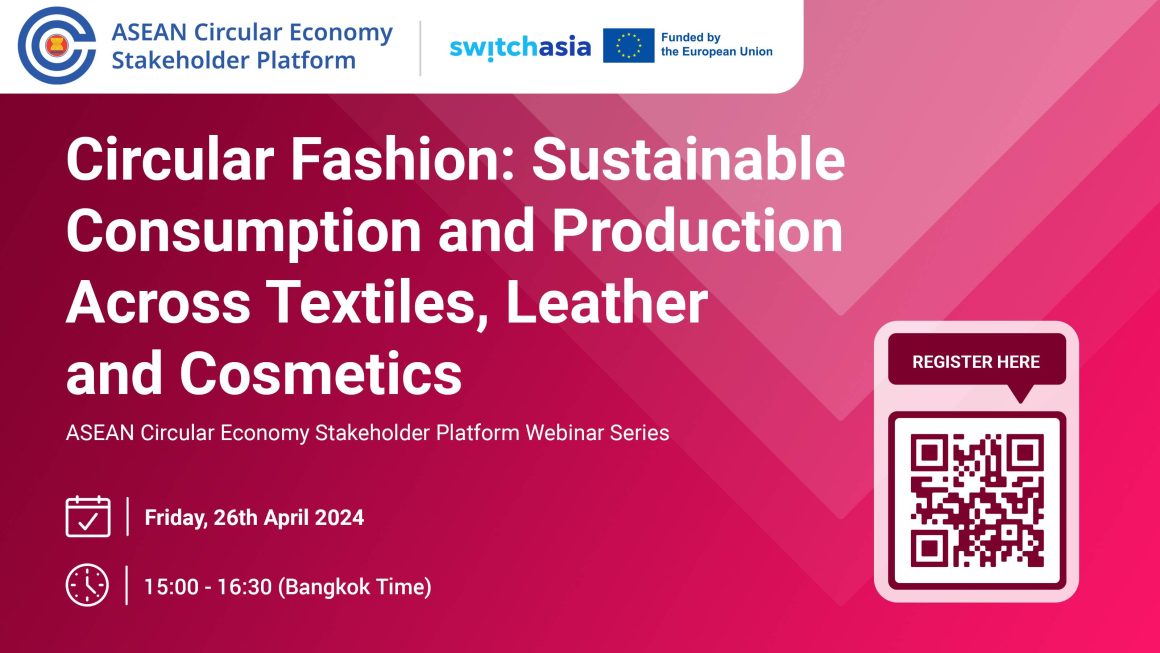ASEAN Circular Economy Stakeholder Platform Webinar Series
WHEN: 26 April 2024 I TIME: 15:00 – 16:30 (Bangkok Time) I Platform: ZOOM I Register HERE
Background:
Fashion has always held significant importance within human society, shaping trends, lifestyles, and economic landscapes. Presently, it stands as the third-largest manufacturing sector globally, trailing only the automobile and technology industries. Encompassing various domains like textiles, garments, accessories, and beauty products, the fashion industry has witnessed rapid expansion to meet ever-growing demands for novelty and style. However, this growth has come at a substantial environmental cost, with its footprint extending from material production to disposal.
The textile and leather sectors, notorious for their high water usage and pollution levels, discharge untreated effluents laden with toxic chemicals and heavy metals, posing grave risks to human health and ecosystems. Moreover, the energy-intensive processes involved, particularly in fabric dyeing, further exacerbate environmental strains. The prevalent fast fashion model compounds these issues by promoting the mass production, consumption, and disposal of low-quality goods, primarily crafted from environmentally harmful synthetic materials such as polyester.
The excessive use of plastic packaging, integral to the distribution of fashion items, adds to environmental burdens, with a significant portion ending up as waste in landfills or oceans. The cosmetic industry, in particular, generates substantial packaging waste, primarily comprising non-biodegradable plastics. In regions like ASEAN and other developing nations, the sale of beauty products in single-use sachets, while offering affordability, worsens waste management challenges, contributing to carbon emissions and fossil fuel consumption.
Addressing these interconnected challenges demands holistic approaches that prioritize sustainable consumption and production (SCP) strategies and embrace circular economy principles. Sustainable practices, including circular fashion and the adoption of eco-friendly materials alongside technological innovations, hold promise in mitigating the industry’s environmental impact. Educating and encouraging consumers to embrace sustainable consumption habits is equally vital in steering the fashion industry towards a more sustainable future.
Webinar Session:
The ASEAN Circular Economy Stakeholder Platform (ACESP) and the EU SWITCH-Asia Policy Support Component (co-host), are convening the webinar, Circular Fashion: Sustainable Consumption and Production Across Textiles, Leather, and Cosmetics with the main objective to highlight how sustainable consumption and production strategies throughout the fashion industry can reduce resource consumption, waste generation, and pollution emission.
About the ASEAN Circular Economy Stakeholder Platform Webinar Series
The webinar series, hosted by the ASEAN Circular Economy Stakeholder Platform and co-hosted by the EU SWITCH-Asia Policy Support Component, is strategically designed to foster the adoption of Sustainable Consumption and Production (SCP) practices in the context of the Circular Economy (CE) across the ASEAN region. Recognising the need for a comprehensive approach addressing both supply and demand aspects and bringing together diverse stakeholders, these webinars intend to raise awareness, promote understanding, and facilitate an inclusive dialogue on making the circular economy a tangible reality in the ASEAN region. Thereby, the series aims to strengthen networks and knowledge exchanges among institutions working towards shared sustainability goals.
Chairs
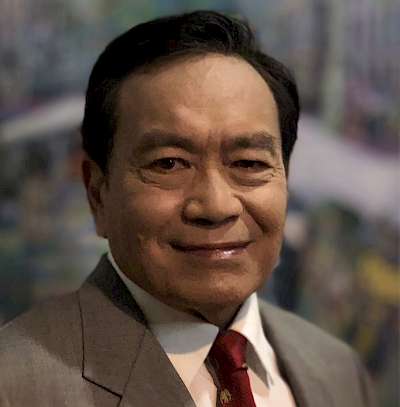 Anthony Pramualratana, ASEAN Circular Economy Stakeholder Platform
Anthony Pramualratana, ASEAN Circular Economy Stakeholder Platform
In July 2022, Dr. Anthony Pramualratana assumed the role of Deputy Executive Director at the ASEAN Centre for Sustainable Development and Studies Dialogue (ACSDSD). The ACSDSD garnered support from leaders during the 34th ASEAN Summit in Bangkok in June 2019 and was officially launched at the 35th ASEAN Summit in Bangkok in November 2019. Its primary objective is to advance research on specific sustainable development issues of mutual interest and facilitate dialogue among ASEAN Sectoral Bodies, Dialogues, and external partners, employing a comprehensive and cross-cutting approach. In September 2022, Dr. Pramualratana played a key role in establishing the ASEAN Circular Economy Stakeholder Platform, a regional facility aimed at helping ASEAN Member States (AMS) achieve sustainable consumption and production by accelerating the transition towards a circular economy.
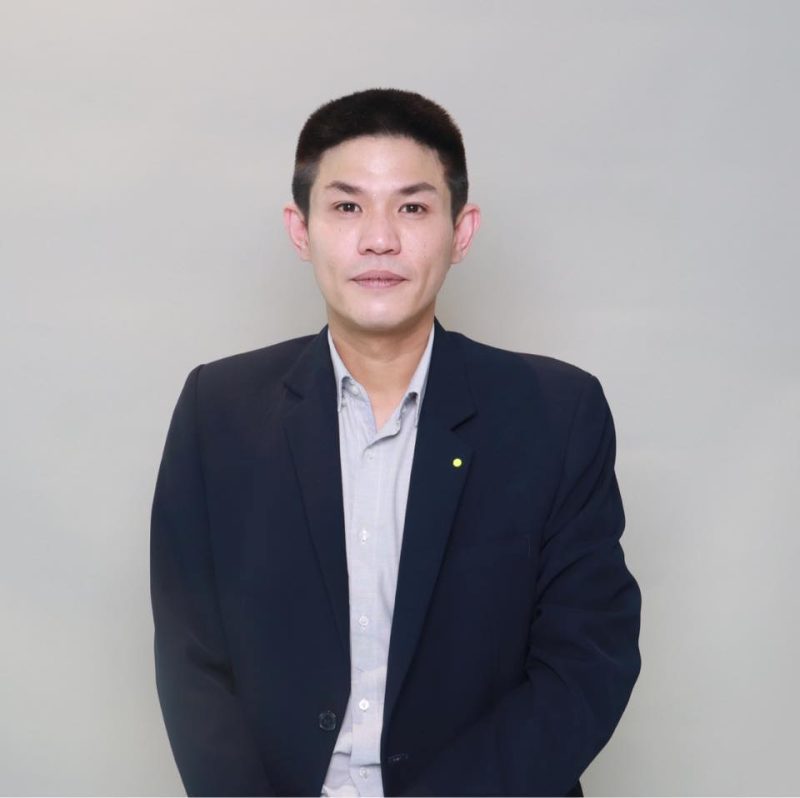 Treesuvit Arriyavat (David), Project Manager, ASEAN Circular Economy Stakeholder Platform
Treesuvit Arriyavat (David), Project Manager, ASEAN Circular Economy Stakeholder Platform
David is a PhD candidate in Management at the College of Management, Mahidol University, Bangkok, Thailand. He holds significant experience in managing projects within the ASEAN context. Currently, David serves as the project manager for the ASEAN Circular Economy Stakeholder Platform (ACESP) at the ASEAN Centre for Sustainable Development Studies and Dialogue (ACSDSD) at Mahidol University, Bangkok. In this capacity, he is responsible for establishing and overseeing the day-to-day operations of the ACESP Secretariat. This role encompasses various tasks, including project coordination, management of the knowledge and information portal, as well as communication and outreach efforts.
Moderators
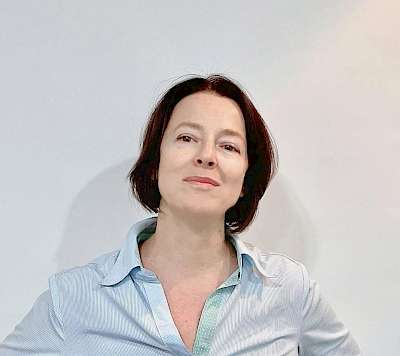 Zinaida Fadeeva, Team Leader at the SWITCH-Asia Policy Support Component
Zinaida Fadeeva, Team Leader at the SWITCH-Asia Policy Support Component
Zinaida Fadeeva is the Team Leader of the Policy Support Component of the SWITCH-Asia Programme. Zinaida has over 25 years leading international professional experience in policy for and practice of sustainable consumption and production (SCP) and Education for Sustainable Development, amongst others working with the United Nations University Institute for the Advanced Studies of Sustainability (UNU-IAS). Her work has focused on diverse topics such as tourism, plastics, construction, small and medium enterprises, procurement and lifestyle. Zinaida has worked extensively with governments, private sector, international organisations and academia in East, South East, South and Central Asia.
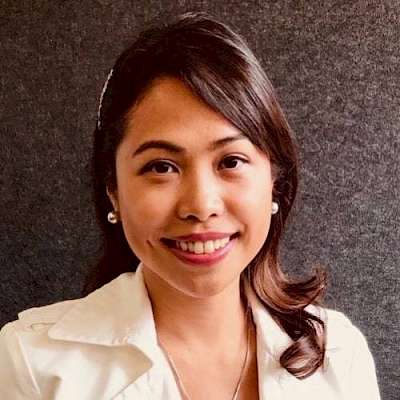 Loraine Gatlabayan, Key Expert on SCP awareness raising and regional partnership building at the SWITCH-Asia Policy Support Component
Loraine Gatlabayan, Key Expert on SCP awareness raising and regional partnership building at the SWITCH-Asia Policy Support Component
Loraine is the Key Expert on SCP awareness raising and regional partnership building of the SWITCH-Asia Policy Support Component of the SWITCH-Asia Programme. She did consultancy work from 2013-2018 in the Asian Development Bank, the United Nations Environment Programme – Regional Office in Asia and Pacific based in Bangkok, Thailand and the Asia-Pacific Roundtable on Sustainable Consumption and Production (APRSCP) activities, where she is currently treasurer and board member. She has also worked at the Climate Change Commission (CCC) the Philippines as Division Chief for Knowledge Management, Director of the Center for Social Policy in the Ateneo School of Government, Ateneo de Manila University, Philippines, and lead various regional, national, and local projects focusing biosafety, access rights in environmental decision- making, transparency and accountability, climate change, and resource efficiency.
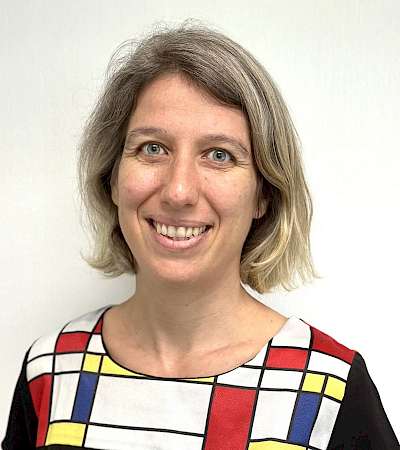 Elodie Maria-Sube, Expert on EU policy development and partnership building at the SWITCH-Asia Policy Support Component
Elodie Maria-Sube, Expert on EU policy development and partnership building at the SWITCH-Asia Policy Support Component
Elodie is the Key Expert on EU policy development and partnership building of the SWITCH-Asia Policy Support Component of the SWITCH-Asia Programme. She is specialized in European Affairs related to topics of circular economy, SCP, climate change and environmental management, and has extensive experience in stakeholder consultation and engagement at the EU level, as well as with high-level officials in Ministries of Environment and Finance in Asia. For over a decade, Elodie has worked in South and South-East Asia on environment and climate change. She is currently leading the SWITCH-Asia Technical Advisory project on Sustainable/ Green Public Procurement for Transformation.
Agenda |
|
|
15:00 |
Introduction to the ASEAN Circular Economy Stakeholder Platform Anthony PRAMUALRATANA and Treesuvit Arriyavat (David), ASEAN Circular Economy Stakeholder Platform |
|
15.05 |
Understanding Fashion Footprint Elodie MARIA-SUBE, Key Expert on EU policy development and partnership building at the SWITCH-Asia Policy Support Component |
|
15:10 |
Panel Discussion: Sustainable Consumption and Production Strategies for Circular Fashion
Moderated by Elodie MARIA-SUBE, Key Expert on EU policy development and partnership building at the SWITCH-Asia Policy Support Component |
|
15:30 |
Panel Discussion: Consumer Awareness and Behaviour Change Towards Slow Fashion
Moderated by Loraine GATLABAYAN, Key Expert on SCP awareness raising and regional partnership building at the SWITCH-Asia Policy Support Component |
|
15:50 |
Panel Discussion: Driving Systemic Change in the Fashion Industry Through Multi-Stakeholder Partnerships:
Moderated by Zinaida FADEEVA, Team Leader, SWITCH-Asia Policy Support Component |
|
16:10 |
Q&A |
|
16:30 |
Concluding remarks and vote of thanks. Anthony PRAMUALRATANA and Treesuvit Arriyavat (David), ASEAN Circular Economy Stakeholder Platform |


